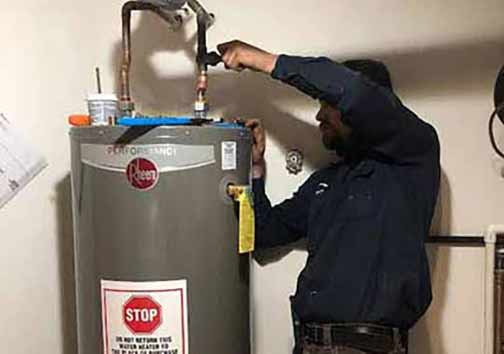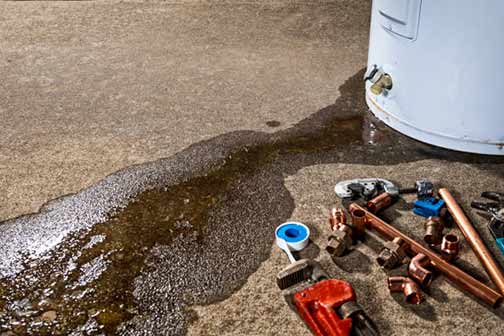
A water heater is an essential appliance in any household, providing hot water for daily activities such as bathing, cooking, and cleaning. Ensuring that your water heater is functioning correctly is crucial for maintaining comfort and efficiency in your home.
Over time, water heaters can develop issues that may indicate the need for replacement. Recognizing these red flags early can help you avoid unexpected breakdowns and costly repairs.
Red Flag #1: Age of the Water Heater
One of the most significant indicators that your water heater may need replacement is its age. Most water heaters have a lifespan of about 8 to 12 years, depending on the type and maintenance. If your water heater is approaching or has surpassed this age range, it is wise to start considering a replacement. Older water heaters are more prone to breakdowns and inefficiencies, leading to higher energy bills and potential water damage.
It’s important to note that even with regular maintenance, the performance of a water heater will naturally degrade over time. Therefore, keeping track of the installation date and planning for a replacement when the unit reaches the end of its expected lifespan can help you avoid unexpected disruptions.
Red Flag #2: Inconsistent Water Temperature
If you notice that your water heater is no longer providing consistent hot water, it could be a sign of a failing unit. Fluctuating water temperatures can indicate issues with the heating elements or thermostat. While minor adjustments or repairs might temporarily resolve the problem, persistent temperature inconsistencies often signal that a replacement is necessary to ensure a reliable hot water supply.
Inconsistent water temperature can be particularly frustrating and inconvenient, especially during peak usage times. Addressing this issue promptly can enhance your daily comfort and prevent further complications that may arise from a malfunctioning water heater.
Red Flag #3: Discolored or Rusty Water
Rusty or discolored water coming from your faucets is a clear indication that your water heater is deteriorating. This issue is typically caused by corrosion inside the tank, which can lead to leaks and contamination of your water supply. If you notice rusty water, it is crucial to address the problem promptly. In many cases, replacing the water heater is the most effective solution to prevent further damage and ensure clean, safe water.
Discolored water can also be a health hazard, as it may contain harmful bacteria or other contaminants. Ensuring that your water heater is in good condition is essential for maintaining the quality and safety of your household water supply.
Red Flag #4: Strange Noises from the Water Heater
Unusual noises such as rumbling, popping, or banging sounds coming from your water heater can be a sign of sediment buildup in the tank. Over time, minerals and debris can accumulate, reducing the efficiency of the unit and causing it to overheat. While flushing the tank might temporarily alleviate the noise, persistent sounds often indicate that the water heater is nearing the end of its lifespan and should be replaced.
Ignoring these noises can lead to more severe issues, such as damage to the heating elements or the tank itself. Addressing the problem early can help you avoid costly repairs and ensure that your water heater operates smoothly and quietly.
Red Flag #5: Leaks Around the Water Heater
Water pooling around the base of your water heater is a serious red flag that requires immediate attention. Leaks can be caused by corrosion, cracks, or loose connections, and they can lead to significant water damage if not addressed promptly. In many cases, repairing a leaking water heater is not cost-effective, and replacing the unit is the best course of action to prevent further issues.
Leaks can also indicate structural weaknesses in the tank, which may worsen over time. By addressing leaks promptly, you can protect your property from water damage and ensure the continued reliability of your water heater.
Red Flag #6: Reduced Hot Water Supply
If you find that your hot water supply is depleting faster than usual, it could be a sign that your water heater is struggling to keep up with demand. This issue can be caused by a variety of factors, including sediment buildup, aging components, or a failing heating element. When your water heater can no longer provide an adequate supply of hot water, it is time to consider a replacement to ensure your household’s needs are met.
A reduced hot water supply can be particularly problematic for larger households or during periods of high usage. Replacing an underperforming water heater can help you maintain a consistent and sufficient hot water supply for all your daily needs.
Red Flag #7: Frequent Repairs
While occasional repairs are expected with any appliance, frequent breakdowns and repairs are a clear indication that your water heater is nearing the end of its lifespan. Constantly investing in repairs can quickly become costly and inconvenient. In such cases, replacing the water heater with a new, more efficient model is often a more cost-effective and reliable solution.
Frequent repairs can also indicate underlying issues that may not be fully resolved by temporary fixes. By opting for a replacement, you can enjoy the benefits of a new, reliable water heater and reduce the hassle and expense of ongoing repairs.
Red Flag #8: Increased Energy Bills
A sudden spike in your energy bills can be a sign that your water heater is no longer operating efficiently. As water heaters age, they become less efficient and require more energy to heat water. This increased energy consumption can lead to higher utility bills. If you notice a significant increase in your energy costs, it may be time to replace your water heater with a more energy-efficient model to save on long-term expenses.
Investing in an energy-efficient water heater can provide substantial savings on your utility bills over time. Additionally, modern water heaters are designed to meet higher energy efficiency standards, reducing your overall environmental impact.

Why Proactive Replacement is a Smart Decision
Proactively replacing your water heater before it fails completely can save you from the inconvenience and potential damage of an unexpected breakdown. A new water heater can provide improved efficiency, reliability, and peace of mind. Additionally, modern water heaters offer advanced features and energy-saving technologies that can reduce your utility bills and environmental impact.
By planning for a replacement in advance, you can take the time to research and select the best water heater for your needs. This proactive approach can help you avoid the stress and urgency of an emergency replacement and ensure a smooth transition to a new, high-performing unit.
Choosing the Right Water Heater for Your Home
When it comes time to replace your water heater, it is essential to choose the right model for your home. Consider factors such as the size of your household, your hot water usage patterns, and your budget. There are various types of water heaters available, including traditional tank water heaters, tankless water heaters, and heat pump water heaters. Each type has its advantages and disadvantages, so it is crucial to research and select the best option for your needs.
For example, tankless water heaters are known for their energy efficiency and ability to provide hot water on demand, while traditional tank water heaters are often more affordable and easier to install. Understanding the pros and cons of each type can help you make an informed decision that aligns with your household’s requirements and preferences.
Contacting a Professional Plumber
Replacing a water heater is a significant investment, and contacting a local plumber can help ensure that you make the right decision. A qualified plumber can assess your current water heater, recommend the best replacement options, and perform the installation safely and efficiently. Additionally, a professional can provide valuable advice on maintaining your new water heater to extend its lifespan and maximize its performance.
By working with a professional, you can have confidence that your new water heater will be installed correctly and operate at its best. A plumber can also help you navigate any potential challenges or complications that may arise during the replacement process.
Maintaining Your New Water Heater
Once you have replaced your water heater, proper maintenance is essential to ensure its longevity and efficiency. Regularly flushing the tank to remove sediment buildup, inspecting the anode rod, and checking for leaks are crucial maintenance tasks. Additionally, scheduling annual professional inspections can help identify and address potential issues before they become significant problems.
By staying proactive with water heater maintenance, you can keep your water heater in optimal condition and avoid unexpected breakdowns. Proper maintenance can also enhance the energy efficiency of your water heater, contributing to lower utility bills and a reduced environmental impact.
Environmental Benefits of Upgrading Your Water Heater
Upgrading to a modern, energy-efficient water heater can have positive environmental impacts. Newer models consume less energy, reducing your carbon footprint and contributing to a more sustainable future. Additionally, many modern water heaters are designed with environmentally friendly materials and technologies, further minimizing their impact on the environment.
By choosing an energy-efficient water heater, you can play a part in conserving natural resources and reducing greenhouse gas emissions. This environmentally conscious decision can benefit both your household and the planet as a whole.
Financial Incentives for Replacing Your Water Heater
In many regions, there are financial incentives available for upgrading to an energy-efficient water heater. These incentives can include rebates, tax credits, and low-interest financing options. Researching and taking advantage of these incentives can help offset the initial cost of a new water heater and make the investment more affordable.
By exploring available incentives, you can maximize the financial benefits of upgrading to a modern, energy-efficient water heater. These incentives can also make it easier to justify the upfront expense of a replacement, knowing that you will save money in the long run through reduced energy costs and potential rebates.
In Summary
Recognizing the red flags that indicate your water heater needs replacement is crucial for maintaining the comfort and efficiency of your home. By proactively addressing issues such as age, inconsistent water temperature, discolored water, strange noises, leaks, reduced hot water supply, frequent repairs, and increased energy bills, you can avoid unexpected breakdowns and costly repairs.
Replacing your water heater with a modern, energy-efficient model can provide numerous benefits, including improved performance, lower utility bills, and a reduced environmental impact. Consulting a professional plumber and maintaining your new water heater are essential steps to ensure its longevity and reliability. By staying informed and proactive, you can make the best decisions for your household’s hot water needs.

